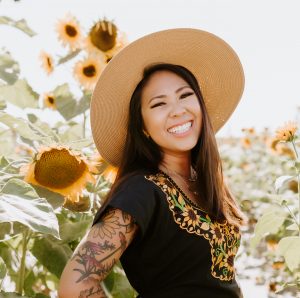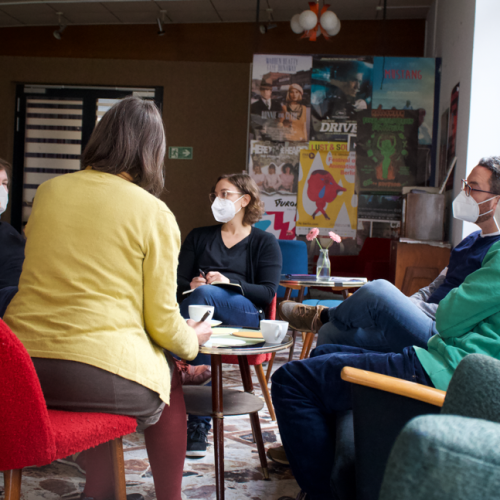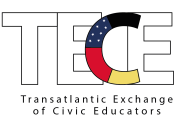

by Drucella Miranda
I was honored with the trust of my colleagues in Thematic Working Group 3: Youth Development to write this contribution to capture our reflection on the topic we focused on, as well as the learnings from the process. What is shared here cannot encapsulate the entirety of our stories, but I hope you can get an idea of what this experience was like for us. Here is a piece of our story.
Originally, five of us were put together as we were interested in best practices around youth empowerment and development. In various capacities, we work directly with youth. Some of us do this through the state government, through higher academia, through non-profits, and even at an international level. At the beginning, some of us felt the sense of not having much to offer as there were some very experienced people in the group, and we thought we would not be able to contribute much. But then we realized that we all had something valuable to contribute, and it was very nice to work with teammates that take your ideas into account – a lesson learned and remembered throughout this process of working together.
This fellowship brought together professionals working in Germany and the United States in different sectors who contribute through their work in various ways to protecting democracy and creating a more inclusive and secure world. While we all had different academic backgrounds and ways of working, we realized that we had much in common. For example, having people of all kinds to be part of the processes that impact our lives was something we identified as important to how we do our work. We also realized that despite the different contexts in which we work, we face very similar difficulties, for example, our increasingly polarized and fragmented societies.
Throughout our time together, both virtually and in-person, a common question we heard over again is “how do we create safe/brave spaces?” We began collecting some promising practices by writing a case study for our own programs in our place of work to begin, however, it became apparent that there was something that needed to be addressed. This can maybe be best illustrated by a student’s realization when they were asked their opinion on whether the voting age should be lowered to 16 years old from the California Center for Civic Participation. This student felt ambivalent because they want to vote, but felt they weren’t prepared or well informed about the world to do so responsibly. Ding ding! There is no magical civics responsibility or education instilled in people when someone becomes a legal adult. In order to work with youth, we must actually begin with ourselves before we begin with youth. As adult people who have been a part of systems that may or may not have failed us to get us ready to engage in the world is an important experience that has shaped us. This then means it influences our work. If we model our work on things that didn’t work well before and based on a status quo, that could be a problem.
During our Germany exchange, we made use of our group time to conduct a focus group with our fellows to make use of the expertise in the room. What was interesting to me was to see how those who did not work directly with the community or youth might have at first felt they were unable to contribute, or worse, saw themselves far removed from the situation. So we asked them to look at themselves and remember when they were young and reflect on when they felt invited to engage or not and why or why not? With this framing, we were able to get our participants to brainstorm and think through the following two questions:
- How might we create spaces to encourage young people to engage in political topics that are important to them?
- What are the barriers to being able to do this?
The answers to these questions helped us to nurture a guide that we prepared for adults who work with young people and who are interested in motivating them to be active in political life and the issues that interest them.

Things that don’t work:
- Strict agendas that leave no room for deep learning or adapting
- Dictating what people should or should not do
- Being the “expert” who thinks they know best or all
At first, I was quite disappointed because I wanted practice tied to the theories and research, and I felt I wasn’t getting that in the first exchange. Our wonderful coordinator was incredibly gracious in her own learning, making space to adapt/pivot and give room for participants’ voices to shape the course of our fellowship. Like most lessons in our sessions and dialogue to deepen the learning, we find more questions than we do answers; a deep reminder that everything is a process. We’ve been learning and adding things into our own process and work every step of the way too as we come into contact with people during site visits or even through the deepening conversations we have with our colleagues. And much reminiscent of how we have been working, during our second exchange in the US, we gained a new colleague, making us a total of 6.
Our work aims to be practical and usable to readers. We began with ourselves and named our values. These inform our design principles to create the activities, projects, and programs we make with/for young people, and at best allow these to be youth-driven. Although we are experts in the field, we understand everyone has an experience they can tap into that has something to offer, which often comes into tension with experts or others, and provides the energy to grow something new and innovative to better serve people, since staying in our same ways won’t always work and often times proves it doesn’t. We invite readers to look internally to see what their valuesto see what guides for their work as well as invite people to add onto the promising practices that they have found works for them or to take what we have and adapt and grow them.
Even though practitioners who are directly working with people in communities and the people themselves may deeply know where we may need to go or what they need, competing priorities and the systems we exist in make things difficult. The structure of our programs enables or disables young people to engage and participate, just like our larger systems also confine our work. If we want to change how people show up, we must challenge and change the systems that create the environment to do so. This makes our work incredibly hard as we must now maintain a self-reflexiveness to make sure we are providing for the community well, while also advocating on behalf of people against larger systems that have competing objectives or fight for financial support.
Key takeaways:
- We need time to get to know one another and build relationships. – “We can only move at the speed of trust.”
- Many of our problems are not new but built off old legacies, which shows the need for deep structural and cultural changes.
- Trust that young people can learn and adapt! In fact, sometimes we adults need to remember that as well. This is probably one of the hardest things to practice. Every day and moment is an opportunity to make a new choice and begin a new practice.
I’m sure many others feel similarly, but as soon as I started to connect with others deeply and begin to know and understand how others in this fellowship think and operate, this exchange was over. Even though this was a wonderful and insightful starting point, it is not a staying point for us. We will continue to move in ways that help us grow and help develop our work to support young people and our communities.
